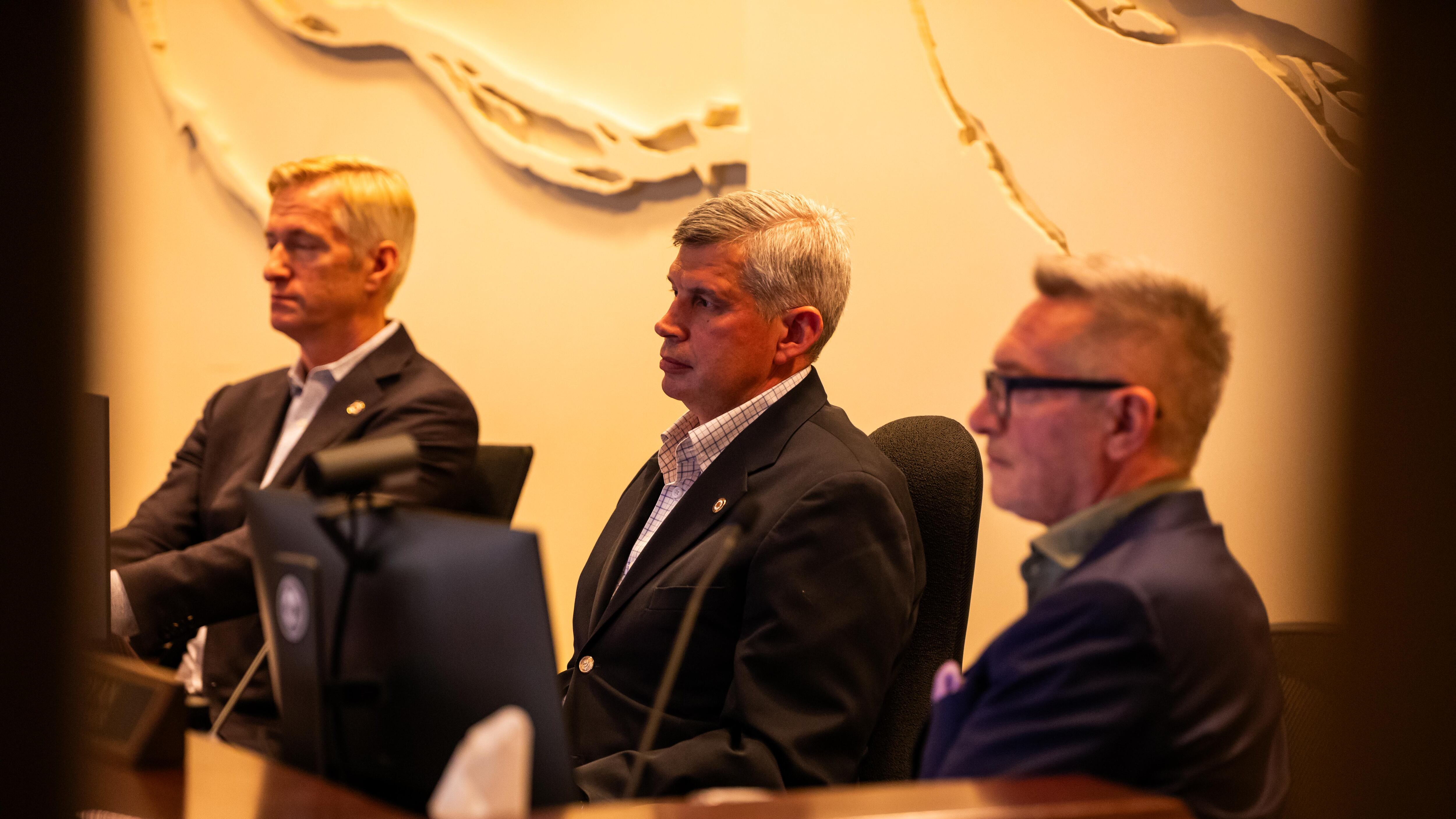A series of sharply worded letters show rifts forming between Mayor Ted Wheeler and his City Council colleagues over how the city should proceed with its government transition over the next 15 months.
In a Sept. 26 letter to his fellow city commissioners, Wheeler outlines obstacles to implementing a new form of government that kicks in Jan. 1, 2025. Wheeler’s letter identifies points of tension in how best to organize the city, both organizationally and physically, over the next 15 months. (Voters approved the overhaul of the city’s elections and governance structure last November.)
The transition is well underway and is being led by the city’s chief administrative officer, Michael Jordan, but there have been a number of hiccups this year that include disgruntlement from neighborhood associations over their uncertain place in the future government, complaints from a transition advisory body that says it feels like a political prop, and general concerns over how the city can make such fundamental changes within two years’ time.
Among the issues Wheeler writes about in his Sept. 26 letter are the expansion of City Hall chambers to accommodate 12 future City Council members, next year’s budget that must “straddle two forms of government simultaneously,” and the debate over when it’s best to bring in a city administrator, who in 2025 will be a top figure in the new form of government.
Wheeler wrote that he’d like a city administrator to serve at least six months before 2025 arrives.
“It would be best to have at least sixth months of operations to pressure test the new structure (more time to work out the inevitable kinks in the transition program would be highly desirable),” Wheeler wrote. “This would mean that no later than July 1st, 2024, we would be ‘open for business’ with an acting City Administrator and Deputy City Administrators fully active.”
Wheeler also made it clear that he’d like to begin revamping City Hall—a necessary but costly move to accommodate the future 12-member City Council—no later than the beginning of 2024.
“Delaying construction until the winter of 2024 or beginning of 2025, as many of you suggested, would cost taxpayers an additional $1.3 million,” Wheeler wrote. “Given the financial and future service impacts of delaying construction, the best course is to commence construction at the beginning of 2024.”
In another document Wheeler shared with his colleagues last week, he laid out three options for how the current City Council could house itself during the City Hall renovation (for which the city has budgeted up to $7.2 million).
But moving all five council offices out of City Hall until 2025 will also cost money, and Wheeler laid out two cost estimates based on scenarios ranging from $893,000 to $1.4 million.
Wheeler warned strongly against a third option that he estimated would cost $2.1 million, which is to delay City Hall construction until 2025. Doing so, he wrote, would present “significant challenges, not the least of which is that there is no work-ready space available in city-owned buildings or other jurisdictional governments to host a 12-member council, and their support staff, in a public meeting while the existing Council Chambers is reconstructed.”
But Commissioners Carmen Rubio, Dan Ryan and Rene Gonzalez are pushing back against specifics of Wheeler’s proposed transition structure.
WW obtained a draft copy of a letter the three commissioners wrote but as of Monday afternoon had not sent in full to the mayor—although a portion of it was sent to the mayor last week.
The three council offices made a number of requests for the transition:
They want to create a sixth bureau cluster that includes Portland Parks & Recreation, the future City Arts Office, the Portland Children’s Levy, and a Natural Resources department (under the proposed reorganization the parks bureau is included in the “Public Works” cluster).
They also ask to reduce the number of deputy city administrators during the transition from six to three to reduce salary costs (an estimated $3 million) and allow the city commissioners to oversee and control their bureau assignments until 2025, even if the mayor chooses to move all the bureaus under his nominal control. (The Oregonian reported Sept. 20 that Wheeler was mulling placing all bureaus under his portfolio until 2025, an idea that other city commissioners swiftly shot down.)
The council offices also made requests for the staffing structure of the City Council offices once 2025 comes.
They proposed starting out with just one dedicated staffer per City Council member, plus shared administrative staff. “If the future council finds new revenue for larger teams, that is within their purview,” they wrote in the draft letter. They also urged adding three more staffers for the mayor’s office under the new form of government: “There is no way a future Mayor has any chance of handling the workload with just three staff members.”
And in an appeal to the mayor, the three offices made it clear they were unhappy with the mayor’s process in recent weeks and months.
“Simply put, how we finish the commission form of government also matters,” the offices wrote. “Our argument is that this should and must be a truly collective endeavor.”
Commissioner Mingus Mapps was the sole holdout on signing the letter. Mapps tells WW he’s sent an alternative letter to the mayor, which WW has requested a copy of.
Wheeler and all city commissioners have a work session on the transition scheduled for Tuesday.
Correction: A previous version of this story stated that Mapps’ office would be one of the signatories on the drafted letter. That’s incorrect. “We sent an alternative letter to the Mayor,” Mapps tells WW.
